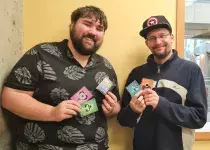
Psychology students at Kwantlen Polytechnic University (KPU) have gamified mental health resources to highlight the support available for children, teens and adults.
Turning the resources into games was part of a final project in the advanced topics in psychopathology course with instructor Jocelyn Lymburner. The games included a puzzle, card game, Jenga and more.
“The projects have a positive impact on the community in which we live and contribute to a pressing need for mental health education and help,” says Lymburner.
“My general goal for course assessments is that they are meaningful and have a ‘life expectancy’ and reach beyond the course itself. I find that students really invest themselves in these projects and feel incredibly proud of the work they do.”
Joseph Kurdziel and Tyrus Drozda created a deck of cards, called One More Time: a Snapshot of Addiction, which highlights four types of addiction in youth - vaping, alcohol, gaming and drugs. Each face card represents a different addiction.
“Face cards include quotes from celebrities that suffer or had experience with those addictions. Other cards have resources and help info for them to access if need be and the rest have facts that inform them about each addiction,” says Kurdziel.

“This has honestly been a dream project for me,” says Drozda. “It started off as just a project for a class but turned into a fantastic memory I'll hold onto forever.”
Hailey Walter, Kajal Verma and Malisha Kumar transformed the popular block game Jenga into Building Emotions, a game to try and improve children’s mental wellbeing. The game is played the same way as Jenga, pulling out blocks until the tower tumbles over, but every time someone removes a block they can read the fact, tip or prompt written on it. The game has been used in a sensory room at an inner city elementary school in Surrey.
“It has also been fun to do some of the prompts with the children, and many children reported feeling better after playing the game,” says Walter. “We are hoping that this game will continue to help children open up about their feelings and reduce the stigma attached to reaching out for help.”
The puzzle project helped children in grades 5 – 7 deal with anxiety. Project team member Kiran Barianna noticed this was prevalent in the elementary school she worked in.
“This puzzle has been made to implement during brain breaks for children. This puzzle will help as a mindfulness approach for children to take part in when they feel stressed,” she adds.
She hopes to use it in her future classroom as she works towards her teaching career.

“It is an issue that is dear to my heart having seen how insidious and ultimately destructive it can be for individuals and their relationships,” says Pearl Meredith. “Poetry can help to satiate the need for spiritual meaning that some believe underlies alcohol abuse.”
Meredith says she’s inspired by this project to generate future works with a similar theme.